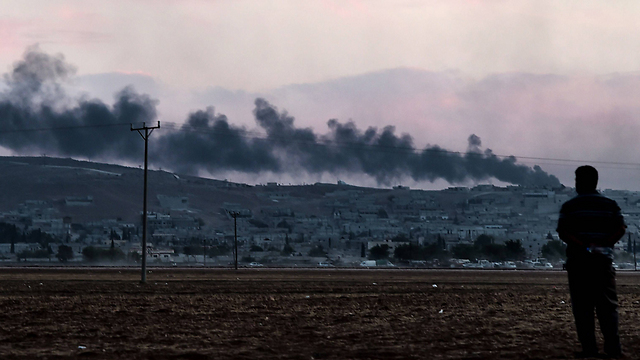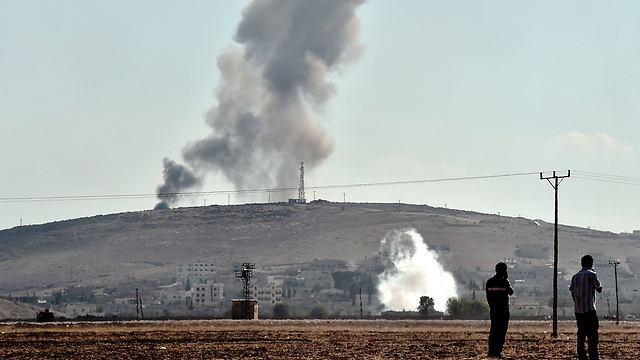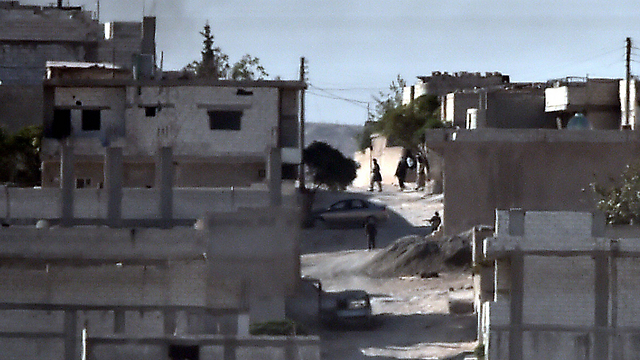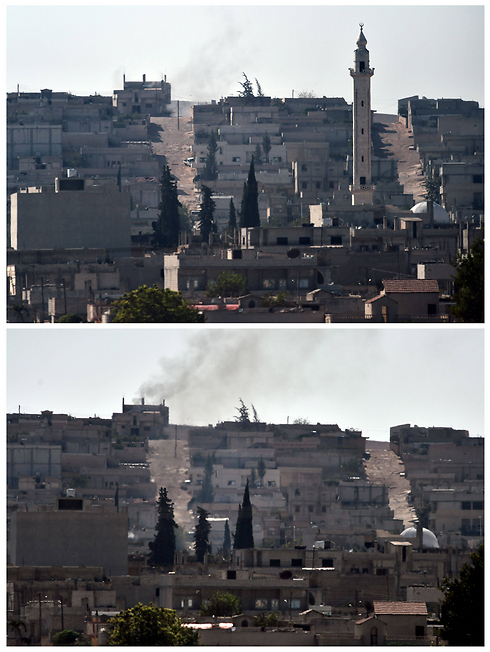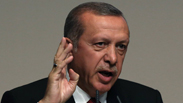
US criticizes Turkey's inaction as IS attacks strategic border town
US official says Ankara can do more to help Syrian Kurds in Kobani, but is 'using excuses not to do more' out of political desire to weaken Kurds.
As United States generals and Secretary of State John Kerry warn that a strategic Syrian border town could fall to Islamic State militants, the Turkish military has deployed its tanks on its side of the frontier but only watched the slaughter.
Turkey's inaction despite its supposed participation in a coalition forged to crush the extremist group is frustrating Washington and its NATO allies, and reviving a rebellion by Turkish Kurds.
Turkish troops have sat on the sidelines as Islamic State militants have fought to gain control of Kobani, a Syrian town on the border with Turkey that is largely populated by Kurds, who also constitute large minorities in Turkey and Iraq.
Turkey is ambivalent about the fight across its border, because of its distrust of the Kurdish fighters protecting Kobani, also known as Ayn Arab. It views them as an extension of the Kurdish PKK, the rebel group that has waged a long and bloody insurgency against Ankara. In recent days, Turkish officials have emphasized that they view both the Islamic State group and the PKK as terrorist groups.Left unsaid is which group they view as the greater threat. But, Turkey's strict neutrality as the lightly-armed Kurds face annihilation speaks volumes.
While Turkey maintains it does not want Kobani to fall, Turkish officials say they will not enter combat until they are assured that the US-led coalition has a long-term strategy in Syria. They see Assad as a greater nemesis on their border than even the Islamic State. Taking out the militants without a plan to fill the inevitable vacuum, they say, will lead to further chaos that will only strengthen Assad.
The result is a standoff between two NATO allies as a militant group that has overrun large parts of Iraq and Syria this year appeared close to seizing Kobani this week.
"There's no question the US government thinks Turkey can do more, should do more, and that they are using excuses not to do more," said the US official, who spoke on condition of anonymity. "We have been sending that message very clearly behind the scenes."
The official suggested that Turkey was juggling its desire not to see the Syrian Kurds strengthened with the potential threat to Turkey's interests, including the continuing flow of Syrian refugees across its border.
"You have to weigh the fact that making the decision not to ... help across the border means your own border is threatened," said the US official of the Turkish calculation. "And if you are not doing that (stopping the IS attack on Kobani) because of political considerations about the Kurds, then you are still putting your own country at risk."
'Faustian bargain'
Analysts suggested that Turkey - while calling for a no-fly zone, a buffer zone in Syria to keep refugees from flowing into its territory and a greater focus on ousting Syrian President Bashar Assad - was really worried about Kurdish autonomy.
"The Turks have made, if you want, a Faustian bargain of sorts," said Henri Barkey, a former member of the US State Department's policy planning staff who now teaches at Lehigh University. "The Faustian bargain is this: they are willing to take in lots of refugees, even though it is costing them a lot, if that means that the Syrian Kurds will face a defeat."
"For Turkey, the greatest threat is the empowerment of the Kurds in Syria," he added. "They see the potential for an autonomous (Kurdish) region in northern Syria ... to be terribly dangerous because if the Syrian Kurds and the Iraqi Kurds have autonomy, next are the Turkish Kurds," Barkey said.
"They don't want to save the Syrian Kurds. They want Kobani to fall because that would be a major, major blow for the Syrian Kurds," he said, adding that a victory for the Syrian Kurds would strengthen the hand of Turkish Kurds in peace talks with Ankara.
Turkish President Tayyip Erdogan initiated the peace process in 2012 with the aim of ending a 30-year-old insurgency by militants pushing for greater Kurdish rights in Turkey. The conflict has killed 40,000 people, most of them Kurds.
Aaron Stein of the London-based Royal United Services Institute think tank said Kobani's fall would give the Islamic State territory on Turkey's border, raise questions about the US strategy of employing its air power mated to local forces on the ground and could undermine Turkey's peace process.
"Turkey doesn't think this anti-IS coalition will achieve much," he said. "Second, if Assad remains then the status quo of these Kurdish cantons (in Syria) would remain, which Turkey doesn't want."
The United States is sending two envoys, retired General John Allen and State Department official Brett McGurk, to Turkey on Thursday and Friday to try to persuade Ankara to do more.
US Secretary of State John Kerry said he expected Turkey to decide "over the next hours, days" what more it may do to confront the Islamic State. A US official suggested the talks would be about more than Kobani, which may already have fallen.
"It's a larger objective with them than Kobani ... a larger discussion," said the official, suggesting that Washington was playing a longer game with Ankara about "the role they can play overall here."
Adding to the pressure on Ankara, Kurds in Kobani and in Turkey accuse the Turkish government of standing idly by while their people are being slaughtered and even impeding their own efforts to save Kobani. The anger boiled into violence Tuesday, amid widespread protests that threatened to derail promising talks to end three decades of insurgency by the PKK militant group. 21 people were killed as Kurdish activists clashed with police and members of an Islamist group in Kurdish areas across the country. The jailed PKK leader Abdullah Ocalan has warned that the peace process will end if Kobani falls.
But Turkey is taking a hard line, insisting that it will only consider involvement in military action as part of a broader strategy for ending the rule of Syrian President Bashar Assad. The US and its allies want to keep the focus on the Islamic State group, which they say poses a more global threat.
Emphasizing the US position, Kerry said Wednesday that although the Obama administration is "deeply concerned about the people of Kobani," preventing the town's fall to Islamic State militants was not a strategic objective for the US.
"As horrific as it is to watch in real time what's happening in Kobani, it's also important to remember, you have to step back and understand the strategic objective," Kerry told a news conference in Washington.
Rear Adm. John Kirby, the Pentagon press secretary, also conceded Kobani could fall because "air power alone is not going to be enough to save that city."
"We all need to prepare ourselves for the reality that other towns and villages - and perhaps Kobani - will be taken by ISIL," Kirby said, adding that the key to eventually defeating the militants is to train and enable indigenous ground forces.
Airstrikes not enough
While two days of US-led airstrikes seem to be slowing the advance of thousands of Islamic State fighters armed with heavy weapons, Kurdish officials warn they have failed to turn the tide.
"The airstrikes have helped. They were good strikes, but not as effective as we want them to be," said Idriss Nassan, deputy head of Kobani's foreign relations committee. "Kobani is still in danger and the airstrikes should intensify in order to remove the danger."
Around noon Wednesday, warplanes believed to be from the US-led coalition bombed Islamic State positions near Kobani. One airstrike, visible from the border, struck a hill and an open space near the town. The Syrian Observatory for Human Rights said Wednesday's strikes targeted Islamic State fighters east of Kobani.
The US Central Command said in a statement that coalition forces had launched airstrikes on six locations around Kobani since Tuesday. Kirby, the Pentagon spokesman, said there were mixed reports about how many Islamic State militants pulled back from the town under pressure from the air.
"We don't have a force inside Syria that we can cooperate with and work with," Kirby said, adding that the US administration is planning to train and arm 5,000 moderate opposition Syrian fighters at sites elsewhere in the Middle East and then insert them back into Syria to take on Islamic State forces.
Since Monday night, the strikes have killed 45 Islamic State fighters in and around Kobani, targeting 20 separate locations and destroying at least five of their vehicles, said the Britain-based Observatory, which relies on a network of activists inside Syria.
The Associated Press and Reuters contributed to this report.










